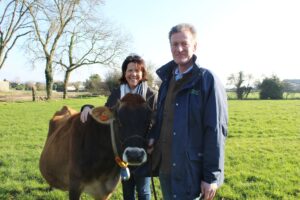This is the text of a speech by Deputy Carolyn Labey, the Jersey States Member with political responsibility for agriculture, to the third Jersey Farming Conference, November 2013:
The speech was the opening address at this event, and follows below in full, as spoken:
‘I WOULD like to start my talk by saying how pleased I am to be speaking at the 3rd Jersey Farming Conference which was set up to provide a platform for the farming industry, [in the same way] as we do for other Sectors of our Economy, such as finance, tourism and construction. It is a forum to discuss the challenges facing the industry, to hear from a range of interesting speakers and to look at the future developments within the industry.
At this juncture, I would like to thank the Department for setting up and organising this conference, and also to the speakers who have agreed to come and speak and make up the interesting programme that we have before us today. Mainly, to thank you for attending and showing an interest in our very important rural enterprise.
If I could start with the challenges facing the industry: Not wishing to sound like something out of a Monty Python sketch; “it has been another difficult year”.
We have suffered a bad winter, made worse by the exceptional snow in March. This resulted in delayed sowing and planting, which obviously delayed the Jersey Royal potato crop, and when it was finally harvested, lower yields were produced.
The Dairy industry has also faced a number of pressures with grass growth being affected in the early season and forage yields down. We then had what most people would have called a fantastic summer. Though farmers being farmers, might disagree with that!
There is no doubt, that our horticultural export sector which is worth 23 million pounds in 2012 has been hit very hard by the changes in LVCR. Submissions to the UK Treasury and subsequently to the UK High court were sadly not successful, but we will continue to seek to influence UK Ministers to try to secure an exemption for locally produced products.
I have to tell you however, that despite what you will have heard in the press in the past few days, this will be a very difficult argument to win. That being said, with a presence in London, Jersey will have a greater opportunity to lobby and influence MPs and Ministers.
Earlier this year, we were faced with the demise of Huelin Renouf which could have resulted in a less competitive sea freight service. But I am pleased to say, that with a significant amount of assistance from the Ports of Jersey, a replacement Lo-Lo service is in operation and it is “business as usual” on our freight routes.
Despite these issues, there is much to be positive about.
Jersey does have a successful agricultural industry. It concentrates on high value, quality products such as the Jersey Royal potato which is protected by both a PDO (Protected Designation of Origin) and a trade mark.
The Dairy industry is developing export markets in Asia, as well as elsewhere in Europe – in particular ice cream into Spain. The gross value of milk products sold by Jersey Dairy last year increased from £11.6M to £11.9M, an increase of 3%.
Exports of arable crops, including bedding and plug plants were worth approximately 53 million pounds in 2012.
Therefore our Rural Economy continues to make a significant contribution to the economy. With the right framework we should be able to drive forward the industry in ways that adapt to the ever changing circumstances which we are in – and by that I just don’t just mean the weather.
The Rural Team is responsible for delivering a 5 year Strategy – which could be longer – which sets the framework for the future of our Industry and Countryside. It is consulted upon with you and interested parties, it is scrutinised, agreed and Government support is given to the tune of 3.7 million pounds a year to assist and deliver those aims.
It provides assistance in health and welfare of our livestock. We are fortunate not to have TB in the Island, which is the most pressing animal welfare issue facing the UK today. Through evidence collated, we are working towards, “official disease free status”, which will help underpin not only the local market, but will help our export drive.
Jersey maintains membership with the European Plant Protection Organisation, which provides an early warning system for pests such as Colorado beetle. Recent scares of Oak Processionary moth and Ash Dieback have served as a timely reminder of the need to prioritize plant health and the centrality of plants to our economy, landscape and history.
Recently the Environmental department introduced software capable of being run on smart phones to log invasive plant species, in order to help develop an eradication programme for the species concerned.
The Rural Team is there to facilitate industry, to work with States Departments and other bodies to create the right conditions for rural businesses to thrive.
If Industry wants, or expects, different services from government, then it is for Industry to say so, in a proper cohesive manner.
To my mind Rural Enterprise has evolved into professional specialised business and should use forums such as this, to exchange ideas and discuss what services, if any, are required from government, and how they should be funded.
The ball is therefore in your court to come forward with suggestions of what you want and how you would like to see it improved – I am sure there is always need for improvement.
The Rural Team administer grants to help deliver the aims of the Strategy, to facilitate business, to enhance the look of our Countryside and vitally to put our farmers on an equal footing to their EU Counterparts – a point sometimes overlooked by some when considering budget cuts and savings.
And as the years go on, the type of rural businesses change and adapt. But the underlying responsible and vital role of farmers, as food producers, has not.
The industry has long been at the forefront of innovation through its development of new processes, technologies and land management techniques.
Alternative energy sources are already being trialed. The use of photovoltaic arrays to generate electricity already plays a part in agriculture in Jersey today. The use of anaerobic digestion to reduce fossil fuel imports is being investigated.
One of the most controversial areas at the moment is the use of Genetically Modified crops. In 1999 the States adopted a proposition which stated that the Island authorities “take all possible steps to designate and maintain the Island of Jersey, free, from the growing of genetically modified organisms.”
The last Rural Economy Strategy called for the States to evaluate its position on GM crops. I fully appreciate the strong feelings on both sides of the argument, but we need to evaluate their current use. GM needs to be considered in its overall context balancing the risks and benefits of the technology – such as reducing the use of pesticides compared with the possible risks to the environment.
To put farming on a sustainable footing, it needs a highly skilled workforce.
Farming creates jobs.
We need entrepreneurial, ambitious people who have both the motivation to succeed and the skills to do so, and I’m happy today to see so many young farmers here. There is work to be done, however, on all sides to help our young people recognise the opportunity that some rural enterprises can provide.
They may have to start in the fields or packing sheds, but can go on to train in IT, land management, people management, animal husbandry, marketing and other skills needed within the industry. Very few young people in Rural Enterprise are going to start with a farm, land, sheds and tractors. Farm work is “different”, the work is hard, but there are a variety of opportunities that we have to help them recognise.
As well as Rural Enterprise producing food, creating jobs, diversifying the economy, the contribution most difficult to quantify is that of environmental protection, maintenance and enhancement.
It is usually lost on economists advising on our budgets, and sometimes even on my colleagues, to the fact that agriculture not only delivers a GVA* of £48M but it adds so much more value to our Island.
Being a small island, protection of the environment is vital and our natural resources are vulnerable to the weather and to the impacts of the population pressures. Therefore it is essential that these are protected to ensure that they are safe for generations to come.
Our countryside which, for the main part, is enhanced and maintained by the agricultural industry, underpins recreation, tourism, finance, in that it is a nice place to work or visit, and also our high net worth residents, who make significant contributions to our tax take, choose Jersey above other destinations citing our countryside as one of their deciding factors.
Rural Enterprise and farming is our Culture, our heritage and we are here today to hear about the various innovations taking place within the sector to help maintain it and drive it forward into the future – for all our benefits.’




